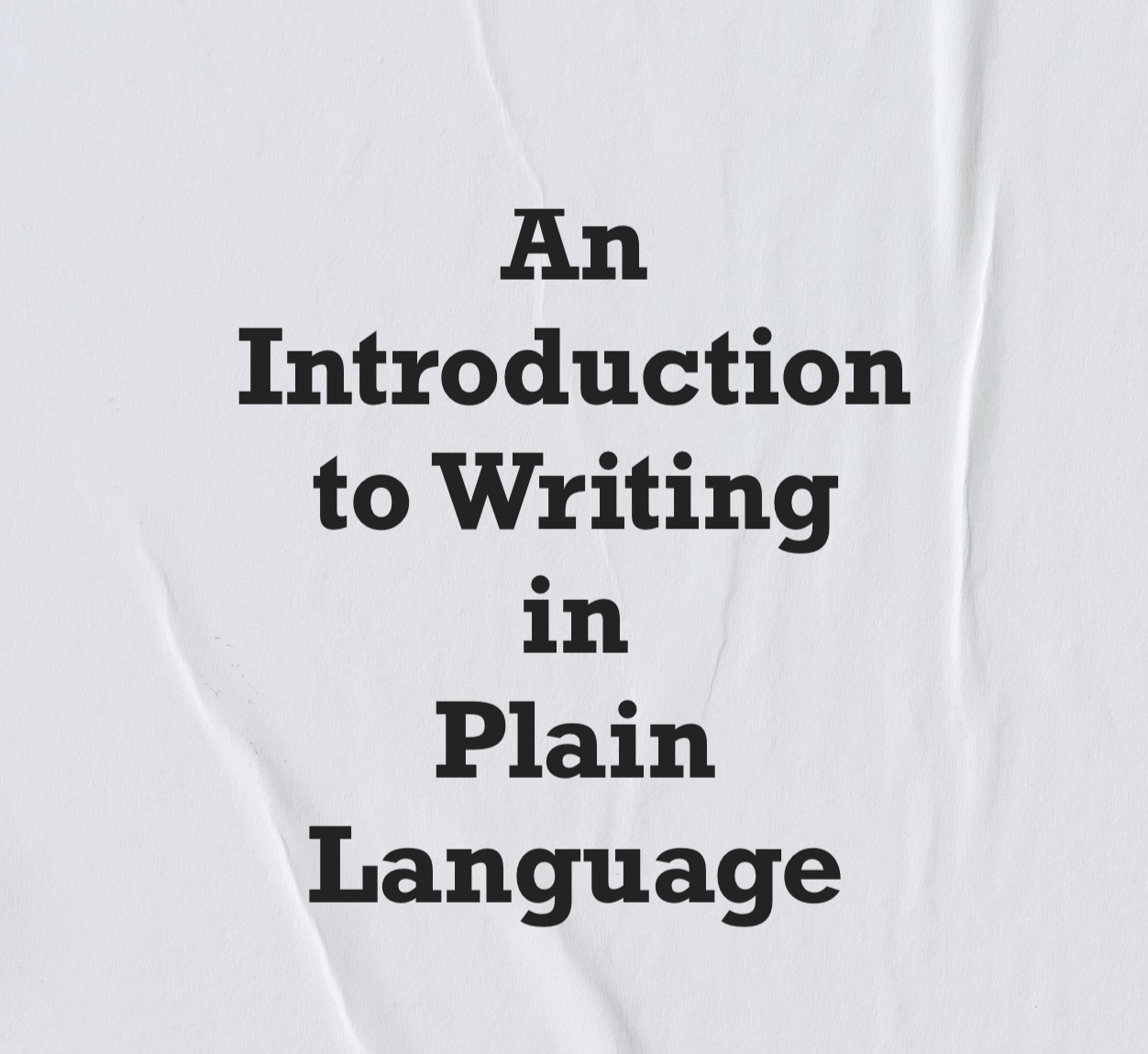Word by word: A look at plain legal English
Any fool can make things bigger, more complex, and more violent. It takes a touch of genius-and a lot of courage-to move in the opposite direction.
— Albert Einstein
Words to live by.
In his book, Plain English for Lawyers, Richard C. Wydick recommends the following tips:
Omit surplus words
Use base verbs, not nominalizations
Prefer the active voice
Use short sentences
Arrange your words with care
Use familiar concrete words
Avoid language quirks
Punctuate carefully
This guide was created for Harvard Library employees, but we hope it’s helpful to a wider community of content creators, editors, producers — anyone who’s trying to communicate a message online.
Who is David Mellinkoff
David Mellinkoff, a lawyer, professor and writer who waged fierce and clever battle against lawyerly language, ”contagious verbosity” in his phrase, died in Los Angeles on Dec. 31. He was 85.
Mr. Mellinkoff waged his war in books, articles and lectures, attacking what he called ”the junk antiques” of the legal vocabulary, those streams of ”forthwiths,” ”heretofores” and ”whereases” that tumble endlessly through lawyers’ writings. Sometimes called the dean of legal writing specialists, he began his campaign for clarity and brevity with his 1963 book, still his most influential, ”Language of the Law” (Aspen Publishers).
Bryan Garner, a Dallas lawyer who heads a company that teaches lawyers to write more clearly and who edited the most recent edition of Black’s Law Dictionary, said ”Language of the Law” proved that ”the argument that legalese is more precise is poppycock.” Although the attack on gobbledygook dates at least to the English utilitarian philosopher Jeremy Bentham, Mr. Garner said Mr. Mellinkoff’s influence was profound because he made the case for plainer language in a style lawyers appreciate: with lots of footnotes and case citations.
In a review of Mr. Mellinkoff’s Dictionary of American Legal Usage (West Publishing Company, 1992), Arthur Gilbert, a California judge, wrote: ”He cross-references words and expressions, enabling you to see how they relate to each other and how they are different from one another. He compares and contrasts ordinary and legal usage so that you can use a legal term with precision.”
7 Rules by David Mellinkoff
In legal writing: Sense and Nonsense David Mellinkoff states his seven rules:
Rule 1: The Language of the Law Is More Peculiar Than Precise. Don’t Confuse Peculiarity With Precision.
Precision is sometimes peculiarly expressed, but don’t be taken in by the peculiar expression of nonsense.
Rule 2: Don’t Ignore Even the Limited Possibilities of precision. The Price of Sloppy Writing is Misunderstanding and Creative Misinterpretation.
Someday someone will read what you have written, trying to find something wrong with it. This is the special burden of legal writing, and the special incentive to be as precise as you can.
Rule 3: Follow the Rules of English Composition.
If it’s bad writing by the standards of ordinary English, it is bad legal writing. If it’s good writing by the standards of ordinary English, it is more likely to be good legal writing.
Rule 4: Usually You Have Choice of how to Say It. Choose Clarity.
Lack of clarity is a common but not necessary feature of legal writing. It is not an inevitable by-product of precision. Clarity depends more on how you say it than on what you have to say. As you write, keep asking, “Clear to Whom?”
Rule 5: Write Law Simply. Do not Puff, Mangle or Hide.
The only thing about legal writing that is both unique and necessary is law. To simplify legal writing, first get the law right. You can’t simplify by omitting what the law requires or including what the law forbids. The better you know the law the easier to decide what law ought to go in, and what is overkill or window dressing.
Rule 6: Before you Write, Plan.
In the quiet time before you become excited with your own words-on-paper, plan. Talk over goals with those who know more law. Mull, jot down, fret, read, outline. Then write. If you start from a plan, the writing will help your thinking and writing. Unplanned, the flow of words becomes a distraction.
Rule 7: Cut it in Half!
Repeat the operation until you run out of time or material. Don’t say the same thing twice inadvertently. Rewrite. Rewrite. Rewrite.
The most valuable of all talents is that of never using two words when one will do.
— Thomas Jefferson
Phrasal Verbs
to set out
to run out
to jot down
to go over
to hang out
Phrasal Verbs
to sum up
to carry out
to show up
to fill out
to come up with
Start here.
Words matter. They are the most basic building blocks of written and spoken communication. Don’t complicate things by using jargon, technical terms, or abbreviations that people won’t understand. Choose your words carefully and be consistent in your writing style.
Word choice is an important part of communicating clearly. While there is generally no problem with being expressive, most federal writing has no place for literary flair. People do not hang out in front of the fire with a federal regulation to have a relaxing read.
Government writing is often stodgy, and full of dry legalisms and jargon. H.W. Fowler summed up these recommendations for making word choices in his influential book, The King’s English, first published in 1906. He encouraged writers to be more simple and direct in their style (quoted in Kimble, 2006):
- Prefer the familiar word to the far-fetched.
- Prefer the concrete word to the abstraction.
- Prefer the single word to the circumlocution.
- Prefer the short word to the long.
- Prefer the Saxon word to the Romance word.
Practical Assignment
Writing Exercise 1.
Write an email explaining the main topic and supporting ideas of a user-friendly guide that can be used to help direct or inform the user. This can contain lists of requirements, exceptions or steps in a process. The conclusion should have a call to action and leave the reader with a clear idea of what they need to do.
10-minute writing time.
200 word minimum.
Please send to [email protected]
When you’re making word choices, pick the familiar or commonly used word over the unusual or obscure. There are many lists of complex words and suggested substitutes, like the one below. See also the lists in Kimble (2006).
This book is unique.
No other American book combines the strong evidence and myth-busting arguments for plain legal language with so much practical advice and so many useful examples. And no other book is more likely to open lawyers’ eyes to the emptiness of legalese — the style that has afflicted legal writing for centuries.
Don’t Say
a and/or b
accompany
accomplish
accorded
accordingly
accrue
accurate
additional
address
adjacent to
advantageous
adversely impact on
advise
afford an opportunity
aircraft
allocate
anticipate
a number of
apparent
appreciable
appropriate
approximate
arrive onboard
as a means of
ascertain
as prescribed by
assist, assistance
attain
attempt
at the present time
Say
a or b or both
go with
carry out, do
given
so
add, gain
correct, exact, right
added, more, other
discuss
next to
helpful
hurt, set back
recommend, tell
allow, let
plane
divide
expect
some
clear, plain
many
proper, right
about/around
arrive
to
find out, learn
in, under
aid, help
meet
try
at present, now
Don’t Say
be advised
benefit
by means of
capability
caveat
close proximity
combined
commence
comply with
component
comprise
concerning
consequently
consolidate
constitutes
contains
convene
currently
Say
be told
help
by, with
ability
warning
near
joint
begin, start
follow/obey
part
form, include, make up
about, on
so
combine, join, merge
is, forms, makes up
has
meet
now
Don’t Say
deem
delete
demonstrate
depart
designate
desire
determine
disclose
discontinue
disseminate
due to the fact that
during the period
effect modifications
elect
eliminate
employ
encounter
endeavor
ensure
enumerate
equipments
equitable
establish
evidenced
evident
exhibit
expedite
expeditious
expend
expertise
expiration
Say
believe, consider, think
cut, drop
prove, show
leave
appoint, choose, name
want, wish
decide, figure, find
show
drop, stop
give, issue, pass, send
due to, since
during
make changes
choose, pick
cut, drop, end
use
meet
try
make sure
count
equipment
fair
set up, prove, show
showed
clear
show
hasten, speed up
fast, quick
spend
ability
end
Don’t Say
facilitate
failed to
feasible
females
finalize
for a period of
for example,______etc.
forfeit
forward
frequently
function
furnish
has a requirement for
herein
heretofore
herewith
however
Say
ease, help
didn’t
can be done, workable
women
complete, finish
for
for example, such as
give up, lose
send
often
act, role, work
give, send
needs
here
until now
below, here
but
Don’t Say
liaison
limited number
magnitude
maintain
maximum
methodology
minimize
minimum
modify
monitor
necessitate
notify
not later than 10 May
not later than 16:00 hrs
notwithstanding
numerous
objective
obligate
observe
operate
optimum
option
Say
discussion
limits
size
keep, support
greatest, largest, most
method
decrease, method
least, smallest
change
check, watch
cause, need
let know, tell
by 10 May, before 11 May
by 4pm
inspite of, still
many
aim, goal
bind, compel
see
run, use, work
best, greatest, most
choice, way
Don’t Say
parameters
participate
perform
permit
pertaining to
portion
possess
practicable
preclude
previous
previously
prioritize
prior to
proceed
proficiency
promulgate
provide
provided that
provides guidance for
purchase
pursuant to
Say
limits
take part
do
let
about, of, on
part
have, own
practical
prevent
earlier
before
rank
before
do, go ahead, try
skill
issue, publish
give, offer, say
if
guides
buy
by, following, per, under
Don’t Say
reflect
regarding
relative to
relocate
remain
remainder
remuneration
render
represents
request
require
requirement
reside
retain
Say
say, show
about, of, on
about, on
move
stay
rest
pay, payment
give, make
is
ask
must, need
need
live
keep
Don’t Say
said, such
selection
set forth in
similar to
solicit
state-of-the-art
subject
submit
subsequent
subsequently
substantial
successfully complete
sufficient
terminate
therefore
therein
thereof
the undersigned
timely
transmit
Say
the, this, that
choice
in
like
ask for, request
latest
the, this, your
give, send
later, next
after, later, then
large, much
complete, pass
enough
end, stop
so
there
its, their
I
prompt
send
Don’t Say
under the provisions of
until such time as
utilize, utilization
validate
viable
vice
warrant
whereas
with reference to
with the exception of
witnessed
your office
/ (slash)
Say
under
until
use
confirm
practical, workable
instead of, versus
call for, permit
because, since
about
except for
saw
you
and, or
Prepositions – In & At
In the case of place, these prepositions have the different meanings.
I am in the hospital. (You are getting treatment)
I am at the hospital. (You are visiting someone there)
You are in school. (You are studying)
You are at school. (You are eating lunch and playing basketball)
You are in the office. (You are working)
You are at the office. (You are “working” 😉
These books will change how you write.
See your level in just 5 minutes.
We can teach you legal English.
About the Author
Eric Froiland
Eric is a legal English teacher from the United States and has been based out of Bogota, Colombia for the last 10 years. He is the owner and founder of Legal English Innovation SAS, which is recognized as the top legal English academy in Colombia and is an official Test of Legal English Skills (TOLES) examination center.









